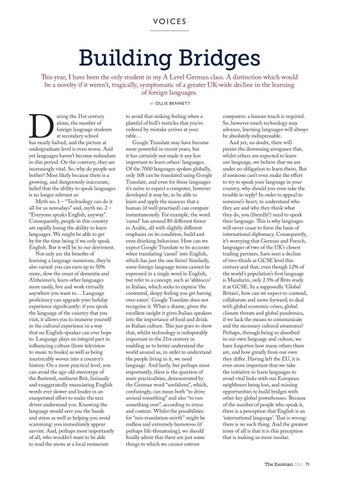VOIC ES
Building Bridges This year, I have been the only student in my A Level German class. A distinction which would be a novelty if it weren’t, tragically, symptomatic of a greater UK-wide decline in the learning of foreign languages.
D
uring the 21st century alone, the number of foreign language students at secondary school has nearly halved, and the picture at undergraduate level is even worse. And yet languages haven’t become redundant in this period. On the contrary, they are increasingly vital. So, why do people not bother? Most likely because there is a growing, and dangerously inaccurate, belief that the ability to speak languages is no longer relevant as: Myth no. 1 – “Technology can do it all for us nowadays” and, myth no. 2 – “Everyone speaks English, anyway”. Consequently, people in this country are rapidly losing the ability to learn languages. We might be able to get by for the time being if we only speak English. But it will be to our detriment. Not only are the benefits of learning a language numerous, they’re also varied: you can earn up to 50% more, slow the onset of dementia and Alzheimer’s, learn other languages more easily, live and work virtually anywhere you want to… Language proficiency can upgrade your holiday experience significantly: if you speak the language of the country that you visit, it allows you to immerse yourself in the cultural experience in a way that no English-speaker can ever hope to. Language plays an integral part in influencing culture (from television to music to books) as well as being inextricably woven into a country’s history. On a more practical level, you can avoid the age-old stereotype of the flustered, sunburnt Brit, furiously and exaggeratedly enunciating English words ever slower and louder in an exasperated effort to make the taxi driver understand you. Knowing the language would save you the hassle and stress as well as helping you avoid scamming: you immediately appear savvier. And, perhaps most importantly of all, who wouldn’t want to be able to read the menu at a local restaurant
by
OLLIE BENNET T
to avoid that sinking feeling when a plateful of bull’s testicles that you’ve ordered by mistake arrives at your table… Google Translate may have become more powerful in recent years, but it has certainly not made it any less important to learn others’ languages. Of the 7000 languages spoken globally, only 108 can be translated using Google Translate, and even for those languages it’s naïve to expect a computer, however developed it may be, to be able to learn and apply the nuances that a human (if well-practised) can compute instantaneously. For example, the word ‘camel’ has around 80 different forms in Arabic, all with slightly different emphases on its condition, build and even drinking behaviour. How can we expect Google Translate to be accurate when translating ‘camel’ into English, which has just the one form? Similarly, some foreign language terms cannot be expressed in a single word in English, but refer to a concept, such as ‘abbiocco’ in Italian, which seeks to express ‘the contented, sleepy feeling you get having over-eaten’. Google Translate does not recognise it. What a shame, given the excellent insight it gives Italian speakers into the importance of food and drink in Italian culture. This just goes to show that, whilst technology is indisputably important in the 21st century in enabling us to better understand the world around us, in order to understand the people living in it, we need language. And lastly, but perhaps most importantly, there is the question of mere practicalities, demonstrated by the German word “umfahren”, which, confusingly, can mean both “to drive around something” and also “to run something over”, according to stress and context. Whilst the possibilities for “mis-translation-mirth” might be endless and extremely humorous (if perhaps life-threatening), we should finally admit that there are just some things to which we cannot entrust
computers: a human touch is required. So, however much technology may advance, learning languages will always be absolutely indispensable. And yet, no doubt, there will persist the distressing arrogance that, whilst others are expected to learn our language, we believe that we are under no obligation to learn theirs. But if someone can’t even make the effort to try to speak your language in your country, why should you even take the trouble to reply? In order to appeal to someone’s heart, to understand who they are and why they think what they do, you (literally!) need to speak their language. This is why languages will never cease to form the basis of international diplomacy. Consequently, it’s worrying that German and French, languages of two of the UK’s closest trading partners, have seen a decline of two-thirds at GCSE level this century and that, even though 12% of the world’s population’s first language is Mandarin, only 2.5% of Brits study it at GCSE. In a supposedly ‘Global Britain’, how can we expect to contend, collaborate and move forward; to deal with global economic crises, global climate threats and global pandemics, if we lack the means to communicate and the necessary cultural awareness? Perhaps, through being so absorbed in our own language and culture, we have forgotten how many others there are, and how greatly from our own they differ. Having left the EU, it is even more important that we take the initiative to learn languages to avoid vital links with our European neighbours being lost, and missing opportunities to build bridges with other key global powerhouses. Because of the number of people who speak it, there is a perception that English is an ‘international language’. That is wrong: there is no such thing. And the greatest irony of all is that it is this perception that is making us more insular.
The Exonian 2021 71
